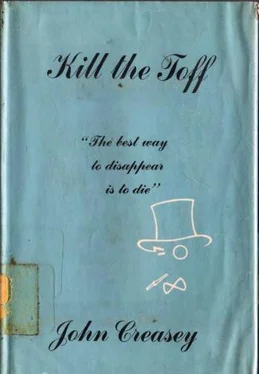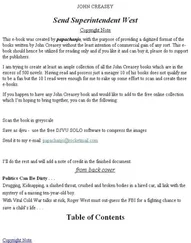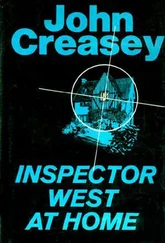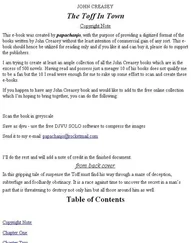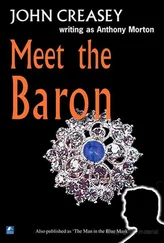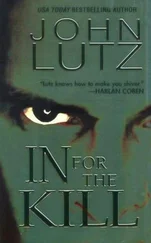John Creasey - Kill The Toff
Здесь есть возможность читать онлайн «John Creasey - Kill The Toff» весь текст электронной книги совершенно бесплатно (целиком полную версию без сокращений). В некоторых случаях можно слушать аудио, скачать через торрент в формате fb2 и присутствует краткое содержание. Жанр: Старинная литература, на русском языке. Описание произведения, (предисловие) а так же отзывы посетителей доступны на портале библиотеки ЛибКат.
- Название:Kill The Toff
- Автор:
- Жанр:
- Год:неизвестен
- ISBN:нет данных
- Рейтинг книги:5 / 5. Голосов: 1
-
Избранное:Добавить в избранное
- Отзывы:
-
Ваша оценка:
- 100
- 1
- 2
- 3
- 4
- 5
Kill The Toff: краткое содержание, описание и аннотация
Предлагаем к чтению аннотацию, описание, краткое содержание или предисловие (зависит от того, что написал сам автор книги «Kill The Toff»). Если вы не нашли необходимую информацию о книге — напишите в комментариях, мы постараемся отыскать её.
Kill The Toff — читать онлайн бесплатно полную книгу (весь текст) целиком
Ниже представлен текст книги, разбитый по страницам. Система сохранения места последней прочитанной страницы, позволяет с удобством читать онлайн бесплатно книгу «Kill The Toff», без необходимости каждый раз заново искать на чём Вы остановились. Поставьте закладку, и сможете в любой момент перейти на страницу, на которой закончили чтение.
Интервал:
Закладка:
It was a large bedroom, beautifully furnished, with a modern silvered oak suite; obviously a woman’s room. On an oval table near the window a bowl of red tulips reminded him of the flowers in the window of 49, Asham Street. The high double bed was spread with gleaming satin, the pale grey carpet had a deep pile; this was a room of luxury. The dressing-table had three long mirrors; a wardrobe occupied most of one wall. There was a faint smell of perfume which he recognised as Clarissa’s.
He closed the door.
Someone moved in another room which led from a corner of this; he could see enough to tell him that it was a bathroom.
Clarissa didn’t come out of there.
He went to the writing-desk, near the tulips; pale blue note-paper and envelopes were in the rack. There were sheets die-stamped 7, Pulham Gate, SW8, others which were quite plain—the size of the paper on which the note to Mellor had been written. He took one of the plain sheets and slipped it into his pocket. The small waste-paper basket was half-full of crumpled paper and used envelopes. He picked it up, found three envelopes addressed to Clarissa Arden at this address, put them into his pocket and replaced the waste-paper basket. As he straightened up, she came out of the bathroom.
She caught her breath at sight of him.
“Oh, hallo,” said Rollison brightly. “I thought I’d return the call.”
“Leave this room at once!”
“Haughty is as haughty does,” murmured Rollison. “I think we’ve a lot to say to each other, precious. It’s naughty and unhealthy to eavesdrop. I don’t think you quite understand the situation or that I can get tough.”
“I told you to leave this room.”
“All in good time. In spite of your false testimony your uncle has been showing signs of improved health. If he stops improving I shall regard your homecoming as more than a coincidence. You’re very lovely, Clarissa—too lovely to have your neck stretched by a hempen rope. But they do hang women and even your money and position wouldn’t save you from a trial. Remember that, every time you get thoughtless and every time you prowl, won’t you?”
“If you don’t leave at once I shall tell Samuel to send for the police.”
“Well, well!” breathed Rollison. “What a lot you have in common with Comrade Waleski!” She flinched and he went towards her, even took her hands, as if they were old, tried friends. “Clarissa, don’t mix with bad men. There may be a spice of excitement, and you may like the breath of danger, but these are really bad men and I should hate to think you were really a bad woman.”
She took her hands away and slapped his face.
“That must be the touch of the Brontes in you,” murmured Rollison. “One final word. When in need, come and see me. I love listening to damsels in distress.”
Her cheeks were white and her lips quivering, her eyes stormy. He smiled and turned away, crossed the room unhurriedly and looked back at her from the door. His eyes were laughing; hers were still furious.
The ice that was in Clarissa Arden had melted.
Snub hadn’t returned when Rollison reached Gresham Terrace. Jolly, who opened the door, raised a hand to exhort silence and whispered that Miss Lome was sleeping on the sofa in the living-room. Rollison looked in. She was fast asleep, a silken cushion beneath her head, a travelling-rug thrown over her.
“You make a good nurse,” murmured Rollison. “How are you amusing yourself?”
“I’ve been testing the note-paper,” said Jolly. “There are some prints which I can’t identify and which don’t appear to be Mellor’s or Miss Lome’s. Will you come and see, sir?”
Once Jolly’s room had been large—nearly as large as Rollison’s. A few months ago, however, Jolly had suggested that a partition be erected so that he could have both a bedroom and a “den.” The “den” was approached by a low door in the wooden partition. Beyond was Jolly’s idea of heaven. He was an enthusiastic amateur photographer with a talent which had only lately been developed; most of the work he did for Rollison, on such affairs as this. He had also worked diligently on the simpler scientific side of criminal investigation and had equipment here which had once been mildly approved by Grice. On a bench beneath the window was a microscope, a bunsen burner, a number of elementary chemical solutions and in the drawers and cupboards which made the den seem tiny was all the paraphernalia of detection including equipment for taking finger-prints. On top of one case were Jolly’s text-books: Gross’s Criminal Investigation, Glaiser’s Medical Jurisprudence and Toxicology and works of lesser renown but equal merit and usefulness.
Rollison seldom ventured here; never without an invitation./
Some photographs of finger-prints were pinned to a small wooden board and by them was a magnifying-glass.
“These need enlarging but you can see them clearly through the glass,” said Jolly.
“Yes. Run powder over these, will you?”
Rollison gave him the envelopes addressed to Clarissa Arden and Jolly opened a small bottle containing grey powder over the envelopes. Prints showed up almost immediately. He blew the powder away gently. As the prints became clearer, he glanced swiftly at Rollison and his voice quivered slightly with excitement.
“I think you’ve made a discovery of importance, sir.”
Rollison said: “Same prints?”
“I’m almost sure. Will you kindly use the glass?”
The prints were huge behind the lens. There were several different ones on each envelope but most were badly smudged, whereas some prints were sharp, clear and superimposed on the others. These were probably the prints which Clarissa had made when she had opened the letters. The loops and whorls had characteristics which could not be confused with the broader prints of the people who had first handled the envelopes.
Rollison turned to the note which read: The best way to disappear is to die. Identical prints were there, much fainter, and with other prints superimposed which he guessed were Mellor’s.
Jolly breathed: “Am I right, sir?”
“I think you are,” said Rollison slowly. “Miss Arden handled the note-paper before Mellor received it.”
“So she sent it.”
“Let’s stick to what we know; she handled the paper.”
“And no one else did, sir, except Mellor and you. Your prints show at two of the corners where you held the paper cautiously. Mellor’s are very clear, top right and centre both sides—where you would expect them to be when he took the note out. Hers are on both sides and fairly general, the kind of prints that one would make when writing a letter and folding it for an envelope. Have you met Miss Arden?”
Rollison laughed. “Yes, and we’re not friends. Like some fresh air, Jolly?”
“Exactly as you wish, sir. I have prepared a supper tray.”
“Good. Go to the Oxford Palace Hotel and find out what you can about Waleski. The police may be watching to see if inquiries are made for him but cock a snook at any policemen. I’m anxious to know whether Clarissa Arden has called on Waleski. I’ll wait here until you return or telephone.”
* * *
Rollison sat in an armchair, near the desk and the telephone. The wall behind the desk was filled with a remarkable miscellany of souvenirs of criminal cases: weapons used for murder; poisons; odd trophies of the hunt. The star piece was a hempen noose; it was Rollison’s boast that a particularly savage murderer had been hanged with it. This was called the Trophy Wall.
Judith still slept, breathing evenly, looking calm and delightful without any sign of strain—as if she were really resting for the first time for weeks. Jolly could exert a remarkably soothing effect and had doubtless impressed her with his view of Rollison’s omnipotence. Now and again she stirred but didn’t wake. Rollison watched her as he thought of Arden, Clarissa, everyone whom he had seen that day. He was trying to put every incident in its proper perspective, to judge the importance of one against the other; and, finally, to judge when it would be necessary and wise to go to the police. The evidence that attempts had been made on Arden’s life was so slender that he doubted whether the police would pay it much attention. There was no evidence that Arden’s legitimate son had been murdered. The police would say, and rightly because of the facts before them, that Rollison was reading crime into a series of unrelated but coincidental circumstances.
Читать дальшеИнтервал:
Закладка:
Похожие книги на «Kill The Toff»
Представляем Вашему вниманию похожие книги на «Kill The Toff» списком для выбора. Мы отобрали схожую по названию и смыслу литературу в надежде предоставить читателям больше вариантов отыскать новые, интересные, ещё непрочитанные произведения.
Обсуждение, отзывы о книге «Kill The Toff» и просто собственные мнения читателей. Оставьте ваши комментарии, напишите, что Вы думаете о произведении, его смысле или главных героях. Укажите что конкретно понравилось, а что нет, и почему Вы так считаете.
